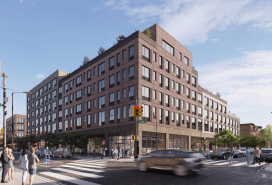How to turn around a renovation turndown

Although co-op and condo boards aren't obligated to, they'll usually tell you why your renovation plan as presented was a no-go. (It's probably one of these 10 reasons.)
At this point, you have a few choices: Wait a few years for the board to turn over and then try again, hoping the new board is more liberal; remove the offending elements from your reno plan; or find a way to assuage the board's concerns.
If you’d rather not wait around--and don't want to jettison a part of your reno plan that you're very attached to--here are some ways to win a do over:
1. Find technology that will mitigate the issues that are worrying the board
New materials and methods for mitigating water, noise and ventilation problems are coming on the market all the time.
Say that you want to replace a wooden floor in an entrance hall with a stone floor. An acoustical engineer can come up with a noise mitigation plan for you that can then be reviewed by an acoustical engineer hired by the building.
According to Ivan Mrakovcic of RAND, for instance, "sound-deadening pads can be added between the finish floor and the sub-floor. There are numerous proprietary products out there." Or a more extreme scenario might involve "the construction of a suspended floor built atop isolation pads that deaden and reduce sound and impact transmission."
Some wet over dry issues can be mitigated as well via technology. New and impressive ways to waterproof kitchen appliances and bathroom sinks, tubs and showers do exist--if your board is willing to take the chance.
Peter Varsalona of RAND Engineering and Architecture says that some boards he works with are willing on a case-by-case basis if they can be convinced of the quality of the waterproofing via detailed plans that indicate replacing old piping with new more reliable materials, new and more effective shower pans, etc.
2. Make your plans more detailed
You need to show that you have planned for the elimination of every possible problem that your reno plan might create. If you weren’t proactive enough the first time around, don’t repeat the mistake. Make sure that follow-up submissions have all necessary additional information and that the drawings are painstakingly detailed for every step of the project.
If there’s any demolition planned, even if it’s not of a load-bearing wall, it still needs to be carefully thought out and presented. The removal of any wall may change the dynamics and the acoustics of an area, says Mrakovcic of RAND.
To understand how one seemingly small detail can sink a renovation plan, Colatrella describes a plan that went belly up because the exterior louvre that was part of a plan to install a sleeve for a an HVAC unit didn’t match the color of the facade.
3. Show how your reno will benefit the building/your neighbors, and/or open your wallet
Both Varsalona and Michael Wolfe, a property manager with Midboro Management, gave this example of the kind of maneuver that might convince the board to reverse their decision: If you’ve been turned down because your electrical upgrades were deemed too much for the building to handle, offer to pay for a building upgrade yourself as a “gift” to your neighbors and the building.
4. Reduce the scope of your plan
If your plan to enlarge the kitchen or bathroom is rejected because of the wet-over-dry prohibition, reconfigure the plan and make sure that all of the parts that require plumbing stick to the wet over wet principal and that the rest is clearly furniture or cabinetry. And, if the board rejects an ambitious upgrade of your electrical system, they may allow a scaled down version. Do you really need that professional range with an exhaust system that requires 1200 CFM’s (cubic feet per minute) when the building typically permits only 600 CFM?
5. Get on the board
Board members are supposed to recuse themselves from the approval process of their own renovation. Recused or not, you'll likely encounter a more sympathetic audience if you're on the board--or better yet, its president.
Related posts:
10 renovation plans your board probably won't go for
Just moved in? Here's how to succeed as a first-time owner
NYC Renovation Questions: Can I move a gas line?
Want to renovate? Here's how to get the money
Approval, Schmoovel: Renovation perks for board members
Ask an Expert: Can I get approved for a wet-over-dry renovation before I buy?
How to put a washer-dryer in your NYC co-op (or condo)
NYC Renovation Qs: What should I know about converting a tub into a shower?
NYC Renovation Chronicles: The cost to renovate a NYC bathroom
NYC Renovation Q's: Does renovating a kitchen pay off when you sell?
NYC renovation Q's: 6 great ideas you'll regret having



























